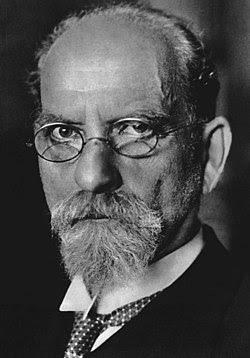GILBERT RYLE'S REVIEW OF HEIDEGGER'S SEIN UND ZEIT

GILBERT RYLE'S REVIEW OF HEIDEGGER'S SEIN UND ZEIT
 |
| Edmund Husserl |
 |
| Martin Heidegger |
| Gilbert Ryle |
GILBERT RYLE'S REVIEW OF HEIDEGGER'S SEIN UND ZEIT
In a 1929 article printed in the journal Mind, Gilbert Ryle wrote a review of Martin Heidegger’s book Sein und Zeit (Being and Time). Although Ryle writes that Heidegger’s book is “a very difficult and important work, which marks a big advance in the application of the ‘Phenomenological Method'", he says "I suspect that this advance is an advance towards disaster.”
If Ryle ever said this about me, I would have quit teaching philosophy. But in this post, I am not going to explain the disaster of which Ryle writes but to point out that there are passages in the article where Ryle appears to approve of the phenomenological method. More than that, Ryle seems to see a consistency between this and analytic philosophy's methodology.
The first consistency appears in Ryle’s explanation of how Heidegger’s teacher Edmund Husserl has a “general theory” of Phenomenology and a general theory of its subject matter: “the intentionality or meaningfulness of consciousness in general.”
Now compare this with the extensive debate in Western analytic philosophy over a general theory about intention or consciousness. Ryle’s 1949 book The Concept of Mind does not contain much on the concept of thinking, but in later years he writes voraciously about the topic. There are also contemporary debates between Daniel Dennett and David Chalmers that are good examples about what Husserl and Heidegger would refer to as debates about a general theory. What they find and defend might be quite different but what they are looking for appears to be identical (intention and consciousness).
There is a second comparison. Ryle writes that Phenomenology’s subject matter is “Essences and not individuals and its method is by 'exemplary intuition’: so that it stands to empirical psychology as geometry stands to geography.” I take it that Essence means “that which is essential,” in the way that being three-sided is essential to being a triangle and being unmarried is essential to being a bachelor. I am not sure that this is exemplary intuition (whatever that means) but Essence is certainly not new. Finding what is essential (Essences) goes back at least to Plato. For example, the concept of Justice is what Socrates says he is looking for in Book 1 of Plato’s Republic but fails to find it. Plato might agree that the concept (form) of justice is the Essence that stands to empirical acts of right and wrong in the way that geometry stands to geography.
A final point. Later
in his life, Ryle writes that there is no place for ‘isms’ in philosophy (Philosophy
, Jul., 1937, Vol. 12, No. 47 (Jul., 1937), pp. 317-332). He means that there is no place for schools of
thought. There is only philosophy, and
philosophy gives us no facts about the world. Ryle says that “the philosopher throws new
light that is resident in the rigors of his argument.” If this is true, there cannot be
"isms" pitted against "isms".
And the answer is “they can’t be pitted.” They are playing on the same field, and the
field is logically rigorous philosophical arguments. There is only one kind of logically rigorous argument and that kind is deductive.
Ryle uses the battle between Monists and the Pluralists as examples,
but his argument also works for an example of a battling Phenomenologist and an Analytic Philosopher who claim they are two
accredited and antagonistic "isms." Suppose that the Phenomenologist
says either that the case for Analytic Philosophy contains some plausible or
probative philosophical arguments, so that the Analytical Philosopher will have discovered
something which she had missed; or her discovery contains no
philosophical arguments which are either plausible or probative, in which case
it will not be a philosophical theory at all, and will not therefore count as an
"antagonistic philosophical theory."
A final word: “The sense in which they throw light is that they [philosophers] make clear what was unclear before, or make obvious things which were previously in a muddle. And the dawning of this desiderated obviousness occurs in the finding of a logically rigorous philosophical argument.”
____________________________
For more information about the differences between phenomenology and analytic philosophy, I recommend an article published in the journal Philosophy Now. https://philosophynow.org/issues/74/Analytic_versus_Continental_Philosophy
- News
- Mysticism
- Horoscope
- Bath & Body
- Soap Making
- Books
- Art
- Causes
- Crafts
- Dance
- Drinks
- Film
- Fitness
- Food
- Игры
- Gardening
- Health
- Главная
- Literature
- Music
- Networking
- Другое
- Party
- Religion
- Shopping
- Sports
- Theater
- Wellness



